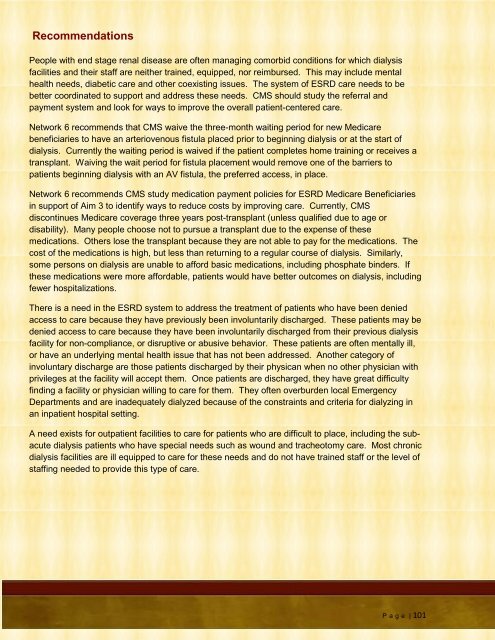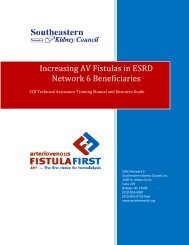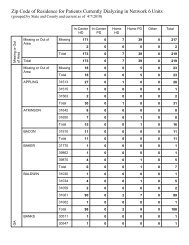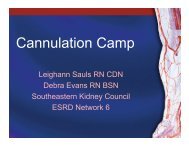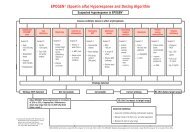ESRD NETWORK 6 2011 ANNUAL REPORT
ESRD NETWORK 6 2011 ANNUAL REPORT
ESRD NETWORK 6 2011 ANNUAL REPORT
You also want an ePaper? Increase the reach of your titles
YUMPU automatically turns print PDFs into web optimized ePapers that Google loves.
RecommendationsPeople with end stage renal disease are often managing comorbid conditions for which dialysisfacilities and their staff are neither trained, equipped, nor reimbursed. This may include mentalhealth needs, diabetic care and other coexisting issues. The system of <strong>ESRD</strong> care needs to bebetter coordinated to support and address these needs. CMS should study the referral andpayment system and look for ways to improve the overall patient-centered care.Network 6 recommends that CMS waive the three-month waiting period for new Medicarebeneficiaries to have an arteriovenous fistula placed prior to beginning dialysis or at the start ofdialysis. Currently the waiting period is waived if the patient completes home training or receives atransplant. Waiving the wait period for fistula placement would remove one of the barriers topatients beginning dialysis with an AV fistula, the preferred access, in place.Network 6 recommends CMS study medication payment policies for <strong>ESRD</strong> Medicare Beneficiariesin support of Aim 3 to identify ways to reduce costs by improving care. Currently, CMSdiscontinues Medicare coverage three years post-transplant (unless qualified due to age ordisability). Many people choose not to pursue a transplant due to the expense of thesemedications. Others lose the transplant because they are not able to pay for the medications. Thecost of the medications is high, but less than returning to a regular course of dialysis. Similarly,some persons on dialysis are unable to afford basic medications, including phosphate binders. Ifthese medications were more affordable, patients would have better outcomes on dialysis, includingfewer hospitalizations.There is a need in the <strong>ESRD</strong> system to address the treatment of patients who have been deniedaccess to care because they have previously been involuntarily discharged. These patients may bedenied access to care because they have been involuntarily discharged from their previous dialysisfacility for non-compliance, or disruptive or abusive behavior. These patients are often mentally ill,or have an underlying mental health issue that has not been addressed. Another category ofinvoluntary discharge are those patients discharged by their physican when no other physician withprivileges at the facility will accept them. Once patients are discharged, they have great difficultyfinding a facility or physician willing to care for them. They often overburden local EmergencyDepartments and are inadequately dialyzed because of the constraints and criteria for dialyzing inan inpatient hospital setting.A need exists for outpatient facilities to care for patients who are difficult to place, including the subacutedialysis patients who have special needs such as wound and tracheotomy care. Most chronicdialysis facilities are ill equipped to care for these needs and do not have trained staff or the level ofstaffing needed to provide this type of care.P a g e | 101


